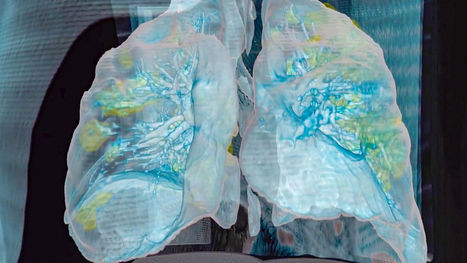The lungs are ground zero for COVID-19, but blood clots may play a surprisingly big role in severe illness. On rounds in a 20-bed intensive care unit (ICU) one recent day, physician Joshua Denson assessed two patients with seizures, many with respiratory failure and others whose kidneys were on a dangerous downhill slide. Days earlier, his rounds had been interrupted as his team tried, and failed, to resuscitate a young woman whose heart had stopped. All shared one thing, says Denson, a pulmonary and critical care physician at the Tulane University School of Medicine. “They are all COVID positive.”
As the number of confirmed cases of COVID-19 surges past 2.2 million globally and deaths surpass 150,000, clinicians and pathologists are struggling to understand the damage wrought by the coronavirus as it tears through the body. They are realizing that although the lungs are ground zero, its reach can extend to many organs including the heart and blood vessels, kidneys, gut, and brain. “[The disease] can attack almost anything in the body with devastating consequences,” says cardiologist Harlan Krumholz of Yale University and Yale-New Haven Hospital, who is leading multiple efforts to gather clinical data on COVID-19. “Its ferocity is breathtaking and humbling.”
Understanding the rampage could help the doctors on the front lines treat the fraction of infected people who become desperately and sometimes mysteriously ill. Does a dangerous, newly observed tendency to blood clotting transform some mild cases into life-threatening emergencies? Is an overzealous immune response behind the worst cases, suggesting treatment with immune-suppressing drugs could help? What explains the startlingly low blood oxygen that some physicians are reporting in patients who nonetheless are not gasping for breath? “Taking a systems approach may be beneficial as we start thinking about therapies,” says Nilam Mangalmurti, a pulmonary intensivist at the Hospital of the University of Pennsylvania (HUP)....
Via Juan Lama



 Your new post is loading...
Your new post is loading...








Acquista Online La Prescrizione Di Perdita Di Peso
Crediamo che i farmaci a volte possano essere molto urgenti da assumere. Se hai urgente bisogno di farmaci, possiamo anche fornirti una consegna espressa,
https://www.google.it/url?q=https://globalefarmacia.com/Prodotto/acquista-ozempic-online/
https://www.google.it/url?q=https://globalefarmacia.com/Prodotto/acquista-victoza-online/
https://www.google.it/url?q=https://globalefarmacia.com/Prodotto/acquista-mounjaro-online/
https://www.google.it/url?q=https://globalefarmacia.com/Prodotto/acquista-mysimba-online/
https://www.google.it/url?q=https://globalefarmacia.com/Prodotto/acquista-wegovy-online/
https://www.google.it/url?q=https://globalefarmacia.com/Prodotto/acquistare-saxenda-6mg-ml-online/
https://www.google.it/url?q=https://globalefarmacia.com/Prodotto/acquista-phentermine-online/
https://www.google.it/url?q=https://globalefarmacia.com/Prodotto/acquistare-sibutramina-online/
https://www.google.it/url?q=https://globalefarmacia.com/Prodotto/ephedrine-hcl-30mg/
https://www.google.it/url?q=https://globalefarmacia.com/Prodotto/acquista-adderall-30mg/
https://www.google.it/url?q=https://globalefarmacia.com/Prodotto/acquista-adipex-online/
https://www.google.it/url?q=https://globalefarmacia.com/Prodotto/acquista-vyvanse-online/
https://www.google.it/url?q=https://globalefarmacia.com/Prodotto/acquista-ossicodone-online/
https://www.google.it/url?q=https://globalefarmacia.com/Prodotto/acquista-oxycontin-online/
https://www.google.it/url?q=https://globalefarmacia.com/Prodotto/acquista-percocet-online/
https://www.google.it/url?q=https://globalefarmacia.com/Prodotto/acquista-stilnox-online/
https://www.google.it/url?q=https://globalefarmacia.com/Prodotto/acquista-suboxone-8mg/
https://www.google.it/url?q=https://globalefarmacia.com/Prodotto/acquista-subutex-online/
https://www.google.it/url?q=https://globalefarmacia.com/Prodotto/acquista-metadone/
https://www.google.it/url?q=https://globalefarmacia.com/Prodotto/acquista-botox-online/
https://www.google.it/url?q=https://globalefarmacia.com/Prodotto/acquistare-rohypnol-2mg/
https://www.google.it/url?q=https://globalefarmacia.com/Prodotto/acquista-l-ritalin-online/
https://www.google.it/url?q=https://globalefarmacia.com/Prodotto/acquista-adma-online/
https://www.google.it/url?q=https://globalefarmacia.com/Prodotto/a-215-ossicodone-actavis/
https://www.google.it/url?q=https://globalefarmacia.com/Prodotto/acquista-ativan-online/
https://www.google.it/url?q=https://globalefarmacia.com/Prodotto/acquista-cerotti-al-fentanil/
https://www.google.it/url?q=https://globalefarmacia.com/Prodotto/acquista-codeina-linctus-online/
https://www.google.it/url?q=https://globalefarmacia.com/Prodotto/acquista-codeina-online/
https://www.google.it/url?q=https://globalefarmacia.com/Prodotto/acquista-demerol-online/
https://www.google.it/url?q=https://globalefarmacia.com/Prodotto/acquista-depalgo-online/
https://www.google.it/url?q=https://globalefarmacia.com/Prodotto/acquista-diazepam-online/
https://www.google.it/url?q=https://globalefarmacia.com/Prodotto/acquista-dilaudid-8mg/
https://www.google.it/url?q=https://globalefarmacia.com/Prodotto/acquista-endocet-online/
https://www.google.it/url?q=https://globalefarmacia.com/Prodotto/acquista-eroina-bianca/
https://www.google.it/url?q=https://globalefarmacia.com/Prodotto/acquista-opana-online/
https://www.google.it/url?q=https://globalefarmacia.com/Prodotto/acquista-vicodin-online/
https://www.google.it/url?q=https://globalefarmacia.com/Prodotto/acquista-xanax-2mg/
https://www.google.it/url?q=https://globalefarmacia.com/Prodotto/efedrina-hcl-in-polvere/
https://www.google.it/url?q=https://globalefarmacia.com/Prodotto/sciroppo-di-metadone/
https://www.google.it/url?q=https://globalefarmacia.com/Prodotto/tramadolo-hcl-200mg/
https://globalefarmacia.com/Prodotto/acquista-ozempic-online/
https://globalefarmacia.com/Prodotto/acquista-victoza-online/
https://globalefarmacia.com/Prodotto/acquista-mounjaro-online/
https://globalefarmacia.com/Prodotto/acquista-mysimba-online/
https://globalefarmacia.com/Prodotto/acquista-wegovy-online/
https://globalefarmacia.com/Prodotto/acquistare-saxenda-6mg-ml-online/
https://globalefarmacia.com/Prodotto/acquista-phentermine-online/
https://globalefarmacia.com/Prodotto/acquistare-sibutramina-online/
https://globalefarmacia.com/Prodotto/ephedrine-hcl-30mg/
https://globalefarmacia.com/Prodotto/acquista-adderall-30mg/
https://globalefarmacia.com/Prodotto/acquista-adipex-online/
https://globalefarmacia.com/Prodotto/acquista-vyvanse-online/
https://globalefarmacia.com/Prodotto/acquista-ossicodone-online/
https://globalefarmacia.com/Prodotto/acquista-oxycontin-online/
https://globalefarmacia.com/Prodotto/acquista-percocet-online/
https://globalefarmacia.com/Prodotto/acquista-stilnox-online/
https://globalefarmacia.com/Prodotto/acquista-suboxone-8mg/
https://globalefarmacia.com/Prodotto/acquista-subutex-online/
https://globalefarmacia.com/Prodotto/acquista-metadone/
https://globalefarmacia.com/Prodotto/acquista-botox-online/
https://globalefarmacia.com/Prodotto/acquistare-rohypnol-2mg/
https://globalefarmacia.com/Prodotto/acquista-l-ritalin-online/
https://globalefarmacia.com/Prodotto/acquista-adma-online/
https://globalefarmacia.com/Prodotto/a-215-ossicodone-actavis/
https://globalefarmacia.com/Prodotto/acquista-ativan-online/
https://globalefarmacia.com/Prodotto/acquista-cerotti-al-fentanil/
https://globalefarmacia.com/Prodotto/acquista-codeina-linctus-online/
https://globalefarmacia.com/Prodotto/acquista-codeina-online/
https://globalefarmacia.com/Prodotto/acquista-demerol-online/
https://globalefarmacia.com/Prodotto/acquista-depalgo-online/
https://globalefarmacia.com/Prodotto/acquista-diazepam-online/
https://globalefarmacia.com/Prodotto/acquista-dilaudid-8mg/
https://globalefarmacia.com/Prodotto/acquista-endocet-online/
https://globalefarmacia.com/Prodotto/acquista-eroina-bianca/
https://globalefarmacia.com/Prodotto/acquista-opana-online/
https://globalefarmacia.com/Prodotto/acquista-vicodin-online/
https://globalefarmacia.com/Prodotto/acquista-xanax-2mg/
https://globalefarmacia.com/Prodotto/efedrina-hcl-in-polvere/
https://globalefarmacia.com/Prodotto/sciroppo-di-metadone/
https://globalefarmacia.com/Prodotto/tramadolo-hcl-200mg/
<a href="https://globalefarmacia.com/Prodotto/acquista-ozempic-online/">acquista-ozempic-online</a>;
<a href="https://globalefarmacia.com/Prodotto/acquista-victoza-online/">acquista-victoza-online</a>;
<a href="https://globalefarmacia.com/Prodotto/acquista-mounjaro-online/">acquista-mounjaro-online</a>;
<a href="https://globalefarmacia.com/Prodotto/acquista-mysimba-online/">acquista-mysimba-online</a>;
<a href="https://globalefarmacia.com/Prodotto/acquista-wegovy-online/">acquista-wegovy-online</a>;
<a href="https://globalefarmacia.com/Prodotto/acquistare-saxenda-6mg-ml-online/">acquistare-saxenda-6mg-ml-online</a>;
<a href="https://globalefarmacia.com/Prodotto/acquista-phentermine-online/">acquista-phentermine-online</a>;
<a href="https://globalefarmacia.com/Prodotto/ephedrine-hcl-30mg/">ephedrine-hcl-30mg</a>;
<a href="https://globalefarmacia.com/Prodotto/acquista-ossicodone-online/">acquista-ossicodone-online</a>;
<a href="https://globalefarmacia.com/Prodotto/acquista-oxycontin-online/">acquista-oxycontin-online</a>;
<a href="https://globalefarmacia.com/Prodotto/acquista-percocet-online/">acquista-percocet-online</a>;
<a href="https://globalefarmacia.com/Prodotto/acquista-stilnox-online/">acquista-stilnox-online</a>;
<a href="https://globalefarmacia.com/Prodotto/acquista-suboxone-8mg/">acquista-suboxone-8mg</a>;
<a href="https://globalefarmacia.com/Prodotto/acquista-subutex-online/">acquista-subutex-online</a>;
<a href="https://globalefarmacia.com/Prodotto/acquista-metadone/">acquista-metadone</a>;
<a href="https://globalefarmacia.com/Prodotto/buy-vyvanse-online/">buy-vyvanse-online</a>;
<a href="https://globalefarmacia.com/Prodotto/a-215-ossicodone-actavis/">a-215-ossicodone-actavis</a>;
<a href="https://globalefarmacia.com/Prodotto/acquista-adderall-30mg/">acquista-adderall-30mg</a>;
<a href="https://globalefarmacia.com/Prodotto/acquista-adipex-online/">acquista-adipex-online</a>;
<a href="https://globalefarmacia.com/Prodotto/acquista-adma-online/">acquista-adma-online</a>;
<a href="https://globalefarmacia.com/Prodotto/acquista-ativan-online/">acquista-ativan-online</a>;
<a href="https://globalefarmacia.com/Prodotto/acquista-botox-online/">acquista-botox-online</a>;
<a href="https://globalefarmacia.com/Prodotto/acquista-cerotti-al-fentanil/">acquista-cerotti-al-fentanil</a>;
<a href="https://globalefarmacia.com/Prodotto/acquista-codeina-linctus-online/">acquista-codeina-linctus-online</a>;
<a href="https://globalefarmacia.com/Prodotto/acquista-codeina-online/">ta-codeina-online</a>;
<a href="https://globalefarmacia.com/Prodotto/acquista-demerol-online/">acquista-demerol-online</a>;
<a href="https://globalefarmacia.com/Prodotto/acquista-depalgo-online/">acquista-depalgo-online</a>;
<a href="https://globalefarmacia.com/Prodotto/acquista-diazepam-online/">acquista-diazepam-online</a>;
<a href="https://globalefarmacia.com/Prodotto/acquista-dilaudid-8mg/">acquista-dilaudid-8mg</a>;
<a href="https://globalefarmacia.com/Prodotto/acquista-endocet-online/">acquista-endocet-online</a>;
<a href="https://globalefarmacia.com/Prodotto/acquista-eroina-bianca/">acquista-eroina-bianca</a>;
<a href="https://globalefarmacia.com/Prodotto/acquista-l-ritalin-online/">acquista-l-ritalin-online</a>;
<a href="https://globalefarmacia.com/Prodotto/acquista-opana-online/">acquista-opana-online</a>;
<a href="https://globalefarmacia.com/Prodotto/acquista-vicodin-online/">acquista-vicodin-online</a>;
<a href="https://globalefarmacia.com/Prodotto/acquista-xanax-2mg/">acquista-xanax-2mg</a>;
<a href="https://globalefarmacia.com/Prodotto/acquistare-rohypnol-2mg/">acquistare-rohypnol-2mg</a>;
<a href="https://globalefarmacia.com/Prodotto/acquistare-sibutramina-online/">acquistare-sibutramina-online</a>;
<a href="https://globalefarmacia.com/Prodotto/efedrina-hcl-in-polvere/">efedrina-hcl-in-polvere</a>;
<a href="https://globalefarmacia.com/Prodotto/sciroppo-di-metadone/">sciroppo-di-metadone</a>;
<a href="https://globalefarmacia.com/Prodotto/tramadolo-hcl-200mg/">tramadolo-hcl-200mg</a>;
<a href="https://www.google.it/url?q=https://globalefarmacia.com/Prodotto/acquista-ozempic-online/" rel="dofollow">acquista-ozempic-online</a>
<a href="https://www.google.it/url?q=https://globalefarmacia.com/Prodotto/acquista-victoza-online/" rel="dofollow">acquista-victoza-online</a>
<a href="https://www.google.it/url?q=https://globalefarmacia.com/Prodotto/acquista-mounjaro-online/" rel="dofollow">acquista-mounjaro-online</a>
<a href="https://www.google.it/url?q=https://globalefarmacia.com/Prodotto/acquista-mysimba-online/" rel="dofollow">acquista-mysimba-online</a>
<a href="https://www.google.it/url?q=https://globalefarmacia.com/Prodotto/acquista-wegovy-online/" rel="dofollow">acquista-wegovy-online</a>
<a href="https://www.google.it/url?q=https://globalefarmacia.com/Prodotto/acquistare-saxenda-6mg-ml-online/" rel="dofollow">acquistare-saxenda-6mg-ml-online</a>
<a href="https://www.google.it/url?q=https://globalefarmacia.com/Prodotto/acquista-phentermine-online/" rel="dofollow">acquista-phentermine-online</a>
<a href="https://www.google.it/url?q=https://globalefarmacia.com/Prodotto/acquistare-sibutramina-online/" rel="dofollow">acquistare-sibutramina-online</a>
<a href="https://www.google.it/url?q=https://globalefarmacia.com/Prodotto/ephedrine-hcl-30mg/" rel="dofollow">ephedrine-hcl-30mg</a>
<a href="https://www.google.it/url?q=https://globalefarmacia.com/Prodotto/acquista-adderall-30mg/" rel="dofollow">acquista-adderall-30mg</a>
<a href="https://www.google.it/url?q=https://globalefarmacia.com/Prodotto/acquista-adipex-online/" rel="dofollow">acquista-adipex-online</a>
<a href="https://www.google.it/url?q=https://globalefarmacia.com/Prodotto/acquista-vyvanse-online/" rel="dofollow">acquista-vyvanse-online</a>
<a href="https://www.google.it/url?q=https://globalefarmacia.com/Prodotto/acquista-ossicodone-online/" rel="dofollow">acquista-ossicodone-online</a>
<a href="https://www.google.it/url?q=https://globalefarmacia.com/Prodotto/acquista-oxycontin-online/" rel="dofollow">acquista-oxycontin-online</a>
<a href="https://www.google.it/url?q=https://globalefarmacia.com/Prodotto/acquista-percocet-online/" rel="dofollow">acquista-percocet-online</a>
<a href="https://www.google.it/url?q=https://globalefarmacia.com/Prodotto/acquista-stilnox-online/" rel="dofollow">acquista-stilnox-online</a>
<a href="https://www.google.it/url?q=https://globalefarmacia.com/Prodotto/acquista-suboxone-8mg/" rel="dofollow">acquista-suboxone-8mg</a>
<a href="https://www.google.it/url?q=https://globalefarmacia.com/Prodotto/acquista-subutex-online/" rel="dofollow">acquista-subutex-online</a>
<a href="https://www.google.it/url?q=https://globalefarmacia.com/Prodotto/acquista-metadone/" rel="dofollow">acquista-metadone</a>
<a href="https://www.google.it/url?q=https://globalefarmacia.com/Prodotto/acquista-botox-online/" rel="dofollow">acquista-botox-online</a>
<a href="https://www.google.it/url?q=https://globalefarmacia.com/Prodotto/acquistare-rohypnol-2mg/" rel="dofollow">acquistare-rohypnol-2mg</a>
<a href="https://www.google.it/url?q=https://globalefarmacia.com/Prodotto/acquista-l-ritalin-online/" rel="dofollow">acquistare-rohypnol-2mg</a>
<a href="https://www.google.it/url?q=https://globalefarmacia.com/Prodotto/acquista-adma-online/" rel="dofollow">acquista-adma-online</a>
<a href="https://www.google.it/url?q=https://globalefarmacia.com/Prodotto/a-215-ossicodone-actavis/" rel="dofollow">a-215-ossicodone-actavis</a>
<a href="https://www.google.it/url?q=https://globalefarmacia.com/Prodotto/acquista-ativan-online/" rel="dofollow">acquista-ativan-online</a>
<a href="https://www.google.it/url?q=https://globalefarmacia.com/Prodotto/acquista-cerotti-al-fentanil/" rel="dofollow">acquista-cerotti-al-fentanil</a>
<a href="https://www.google.it/url?q=https://globalefarmacia.com/Prodotto/acquista-codeina-linctus-online/" rel="dofollow">acquista-codeina-linctus-online</a>
<a href="https://www.google.it/url?q=https://globalefarmacia.com/Prodotto/acquista-codeina-online/" rel="dofollow">acquista-codeina-online</a>
<a href="https://www.google.it/url?q=https://globalefarmacia.com/Prodotto/acquista-demerol-online/" rel="dofollow">acquista-demerol-online</a>
<a href="https://www.google.it/url?q=https://globalefarmacia.com/Prodotto/acquista-depalgo-online/" rel="dofollow">acquista-depalgo-online</a>
<a href="https://www.google.it/url?q=https://globalefarmacia.com/Prodotto/acquista-diazepam-online/" rel="dofollow">acquista-diazepam-online</a>
<a href="https://www.google.it/url?q=https://globalefarmacia.com/Prodotto/acquista-dilaudid-8mg/" rel="dofollow">acquista-dilaudid-8mg</a>
<a href="https://www.google.it/url?q=https://globalefarmacia.com/Prodotto/acquista-endocet-online/" rel="dofollow">acquista-endocet-online</a>
<a href="https://www.google.it/url?q=https://globalefarmacia.com/Prodotto/acquista-eroina-bianca/" rel="dofollow">acquista-eroina-bianca</a>
<a href="https://www.google.it/url?q=https://globalefarmacia.com/Prodotto/acquista-opana-online/" rel="dofollow">acquista-opana-online</a>
<a href="https://www.google.it/url?q=https://globalefarmacia.com/Prodotto/acquista-vicodin-online/" rel="dofollow">acquista-vicodin-online</a>
<a href="https://www.google.it/url?q=https://globalefarmacia.com/Prodotto/acquista-xanax-2mg/" rel="dofollow">acquista-xanax-2mg</a>
<a href="https://www.google.it/url?q=https://globalefarmacia.com/Prodotto/efedrina-hcl-in-polvere/" rel="dofollow">efedrina-hcl-in-polvere</a>
<a href="https://www.google.it/url?q=https://globalefarmacia.com/Prodotto/sciroppo-di-metadone/" rel="dofollow">sciroppo-di-metadone</a>
<a href="https://www.google.it/url?q=https://globalefarmacia.com/Prodotto/tramadolo-hcl-200mg/" rel="dofollow">tramadolo-hcl-200mg</a>
https://www.bing.it/url?q=https://globalefarmacia.com/Prodotto/acquista-ozempic-online/
https://www.bing.it/url?q=https://globalefarmacia.com/Prodotto/acquista-victoza-online/
https://www.bing.it/url?q=https://globalefarmacia.com/Prodotto/acquista-mounjaro-online/
https://www.bing.it/url?q=https://globalefarmacia.com/Prodotto/acquista-mysimba-online/
https://www.bing.it/url?q=https://globalefarmacia.com/Prodotto/acquista-wegovy-online/
https://www.bing.it/url?q=https://globalefarmacia.com/Prodotto/acquistare-saxenda-6mg-ml-online/
https://www.bing.it/url?q=https://globalefarmacia.com/Prodotto/acquista-phentermine-online/
https://www.bing.it/url?q=https://globalefarmacia.com/Prodotto/acquistare-sibutramina-online/
https://www.bing.it/url?q=https://globalefarmacia.com/Prodotto/ephedrine-hcl-30mg/
https://www.bing.it/url?q=https://globalefarmacia.com/Prodotto/acquista-adderall-30mg/
https://www.bing.it/url?q=https://globalefarmacia.com/Prodotto/acquista-adipex-online/
https://www.bing.it/url?q=https://globalefarmacia.com/Prodotto/acquista-vyvanse-online/
https://www.bing.it/url?q=https://globalefarmacia.com/Prodotto/acquista-ossicodone-online/
https://www.bing.it/url?q=https://globalefarmacia.com/Prodotto/acquista-oxycontin-online/
https://www.bing.it/url?q=https://globalefarmacia.com/Prodotto/acquista-percocet-online/
https://www.bing.it/url?q=https://globalefarmacia.com/Prodotto/acquista-stilnox-online/
https://www.bing.it/url?q=https://globalefarmacia.com/Prodotto/acquista-suboxone-8mg/
https://www.bing.it/url?q=https://globalefarmacia.com/Prodotto/acquista-subutex-online/
https://www.bing.it/url?q=https://globalefarmacia.com/Prodotto/acquista-metadone/
https://www.bing.it/url?q=https://globalefarmacia.com/Prodotto/acquista-botox-online/
https://www.bing.it/url?q=https://globalefarmacia.com/Prodotto/acquistare-rohypnol-2mg/
https://www.bing.it/url?q=https://globalefarmacia.com/Prodotto/acquista-l-ritalin-online/
https://www.bing.it/url?q=https://globalefarmacia.com/Prodotto/acquista-adma-online/
https://www.bing.it/url?q=https://globalefarmacia.com/Prodotto/a-215-ossicodone-actavis/
https://www.bing.it/url?q=https://globalefarmacia.com/Prodotto/acquista-ativan-online/
https://www.bing.it/url?q=https://globalefarmacia.com/Prodotto/acquista-cerotti-al-fentanil/
https://www.bing.it/url?q=https://globalefarmacia.com/Prodotto/acquista-codeina-linctus-online/
https://www.bing.it/url?q=https://globalefarmacia.com/Prodotto/acquista-codeina-online/
https://www.bing.it/url?q=https://globalefarmacia.com/Prodotto/acquista-demerol-online/
https://www.bing.it/url?q=https://globalefarmacia.com/Prodotto/acquista-depalgo-online/
https://www.bing.it/url?q=https://globalefarmacia.com/Prodotto/acquista-diazepam-online/
https://www.bing.it/url?q=https://globalefarmacia.com/Prodotto/acquista-dilaudid-8mg/
https://www.bing.it/url?q=https://globalefarmacia.com/Prodotto/acquista-endocet-online/
https://www.bing.it/url?q=https://globalefarmacia.com/Prodotto/acquista-eroina-bianca/
https://www.bing.it/url?q=https://globalefarmacia.com/Prodotto/acquista-opana-online/
https://www.bing.it/url?q=https://globalefarmacia.com/Prodotto/acquista-vicodin-online/
https://www.bing.it/url?q=https://globalefarmacia.com/Prodotto/acquista-xanax-2mg/
https://www.bing.it/url?q=https://globalefarmacia.com/Prodotto/efedrina-hcl-in-polvere/
https://www.bing.it/url?q=https://globalefarmacia.com/Prodotto/sciroppo-di-metadone/
https://www.bing.it/url?q=https://globalefarmacia.com/Prodotto/tramadolo-hcl-200mg/
<a href="https://www.bing.it/url?q=https://globalefarmacia.com/Prodotto/acquista-ozempic-online/" rel="dofollow">acquista-ozempic-online</a>
<a href="https://www.bing.it/url?q=https://globalefarmacia.com/Prodotto/acquista-victoza-online/" rel="dofollow">acquista-victoza-online</a>
<a href="https://www.bing.it/url?q=https://globalefarmacia.com/Prodotto/acquista-mounjaro-online/" rel="dofollow">acquista-mounjaro-online</a>
<a href="https://www.bing.it/url?q=https://globalefarmacia.com/Prodotto/acquista-mysimba-online/" rel="dofollow">acquista-mysimba-online</a>
<a href="https://www.bing.it/url?q=https://globalefarmacia.com/Prodotto/acquista-wegovy-online/" rel="dofollow">acquista-wegovy-online</a>
<a href="https://www.bing.it/url?q=https://globalefarmacia.com/Prodotto/acquistare-saxenda-6mg-ml-online/" rel="dofollow">acquistare-saxenda-6mg-ml-online</a>
<a href="https://www.bing.it/url?q=https://globalefarmacia.com/Prodotto/acquista-phentermine-online/" rel="dofollow">acquista-phentermine-online</a>
<a href="https://www.bing.it/url?q=https://globalefarmacia.com/Prodotto/acquistare-sibutramina-online/" rel="dofollow">acquistare-sibutramina-online</a>
<a href="https://www.bing.it/url?q=https://globalefarmacia.com/Prodotto/ephedrine-hcl-30mg/" rel="dofollow">ephedrine-hcl-30mg</a>
<a href="https://www.bing.it/url?q=https://globalefarmacia.com/Prodotto/acquista-adderall-30mg/" rel="dofollow">acquista-adderall-30mg</a>
<a href="https://www.bing.it/url?q=https://globalefarmacia.com/Prodotto/acquista-adipex-online/" rel="dofollow">acquista-adipex-online</a>
<a href="https://www.bing.it/url?q=https://globalefarmacia.com/Prodotto/acquista-vyvanse-online/" rel="dofollow">acquista-vyvanse-online</a>
<a href="https://www.bing.it/url?q=https://globalefarmacia.com/Prodotto/acquista-ossicodone-online/" rel="dofollow">acquista-ossicodone-online</a>
<a href="https://www.bing.it/url?q=https://globalefarmacia.com/Prodotto/acquista-oxycontin-online/" rel="dofollow">acquista-oxycontin-online</a>
<a href="https://www.bing.it/url?q=https://globalefarmacia.com/Prodotto/acquista-percocet-online/" rel="dofollow">acquista-percocet-online</a>
<a href="https://www.bing.it/url?q=https://globalefarmacia.com/Prodotto/acquista-stilnox-online/" rel="dofollow">acquista-stilnox-online</a>
<a href="https://www.bing.it/url?q=https://globalefarmacia.com/Prodotto/acquista-suboxone-8mg/" rel="dofollow">acquista-suboxone-8mg</a>
<a href="https://www.bing.it/url?q=https://globalefarmacia.com/Prodotto/acquista-subutex-online/" rel="dofollow">acquista-subutex-online</a>
<a href="https://www.bing.it/url?q=https://globalefarmacia.com/Prodotto/acquista-metadone/" rel="dofollow">acquista-metadone</a>
<a href="https://www.bing.it/url?q=https://globalefarmacia.com/Prodotto/acquista-botox-online/" rel="dofollow">acquista-botox-online</a>
<a href="https://www.bing.it/url?q=https://globalefarmacia.com/Prodotto/acquistare-rohypnol-2mg/" rel="dofollow">acquistare-rohypnol-2mg</a>
<a href="https://www.bing.it/url?q=https://globalefarmacia.com/Prodotto/acquista-l-ritalin-online/" rel="dofollow">acquistare-rohypnol-2mg</a>
<a href="https://www.bing.it/url?q=https://globalefarmacia.com/Prodotto/acquista-adma-online/" rel="dofollow">acquista-adma-online</a>
<a href="https://www.bing.it/url?q=https://globalefarmacia.com/Prodotto/a-215-ossicodone-actavis/" rel="dofollow">a-215-ossicodone-actavis</a>
<a href="https://www.bing.it/url?q=https://globalefarmacia.com/Prodotto/acquista-ativan-online/" rel="dofollow">acquista-ativan-online</a>
<a href="https://www.bing.it/url?q=https://globalefarmacia.com/Prodotto/acquista-cerotti-al-fentanil/" rel="dofollow">acquista-cerotti-al-fentanil</a>
<a href="https://www.bing.it/url?q=https://globalefarmacia.com/Prodotto/acquista-codeina-linctus-online/" rel="dofollow">acquista-codeina-linctus-online</a>
<a href="https://www.bing.it/url?q=https://globalefarmacia.com/Prodotto/acquista-codeina-online/" rel="dofollow">acquista-codeina-online</a>
<a href="https://www.bing.it/url?q=https://globalefarmacia.com/Prodotto/acquista-demerol-online/" rel="dofollow">acquista-demerol-online</a>
<a href="https://www.bing.it/url?q=https://globalefarmacia.com/Prodotto/acquista-depalgo-online/" rel="dofollow">acquista-depalgo-online</a>
<a href="https://www.bing.it/url?q=https://globalefarmacia.com/Prodotto/acquista-diazepam-online/" rel="dofollow">acquista-diazepam-online</a>
<a href="https://www.bing.it/url?q=https://globalefarmacia.com/Prodotto/acquista-dilaudid-8mg/" rel="dofollow">acquista-dilaudid-8mg</a>
<a href="https://www.bing.it/url?q=https://globalefarmacia.com/Prodotto/acquista-endocet-online/" rel="dofollow">acquista-endocet-online</a>
<a href="https://www.bing.it/url?q=https://globalefarmacia.com/Prodotto/acquista-eroina-bianca/" rel="dofollow">acquista-eroina-bianca</a>
<a href="https://www.bing.it/url?q=https://globalefarmacia.com/Prodotto/acquista-opana-online/" rel="dofollow">acquista-opana-online</a>
<a href="https://www.bing.it/url?q=https://globalefarmacia.com/Prodotto/acquista-vicodin-online/" rel="dofollow">acquista-vicodin-online</a>
<a href="https://www.bing.it/url?q=https://globalefarmacia.com/Prodotto/acquista-xanax-2mg/" rel="dofollow">acquista-xanax-2mg</a>
<a href="https://www.bing.it/url?q=https://globalefarmacia.com/Prodotto/efedrina-hcl-in-polvere/" rel="dofollow">efedrina-hcl-in-polvere</a>
<a href="https://www.bing.it/url?q=https://globalefarmacia.com/Prodotto/sciroppo-di-metadone/" rel="dofollow">sciroppo-di-metadone</a>
<a href="https://www.bing.it/url?q=https://globalefarmacia.com/Prodotto/tramadolo-hcl-200mg/" rel="dofollow">tramadolo-hcl-200mg</a>